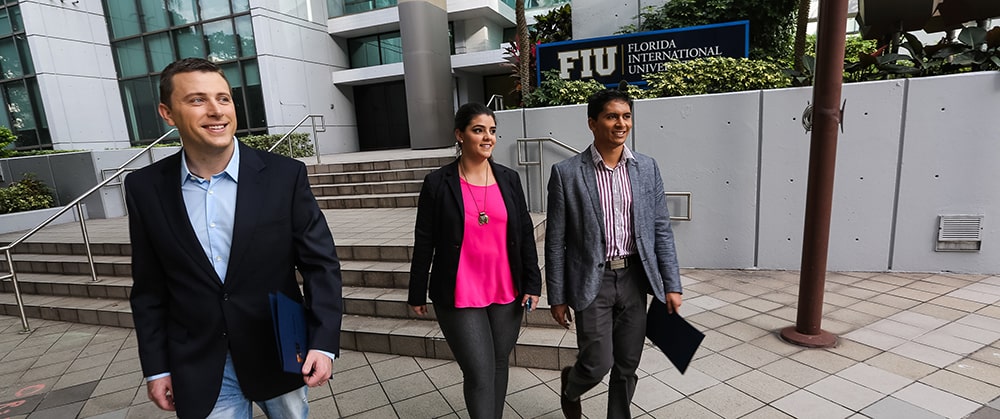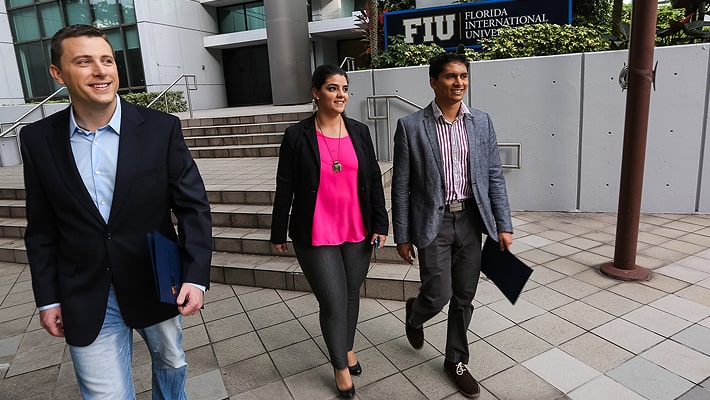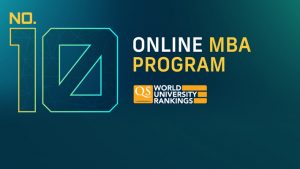
Over two decades before COVID-19 created a tsunami of demand for remote classes, FIU Business began its venture into distance learning. In 1999, a pilot program of 10 classes was developed to meet the needs of a growing audience of working professionals who could not access traditional in-person learning. The goal: open educational opportunities to those who wanted to advance their education but needed flexibility and accessibility to make it happen.
More than 20 years later, with a constant expansion of offerings, FIU Business has taken its place as a recognized leader in graduate online education. U.S. News & World Report’s 2022 rankings placed the college’s online specialized master’s programs No. 18 in the U.S. while the online MBA program was ranked No. 42, up from No. 59 in 2021. Online graduate programs now include the Professional MBA Online program, an Online Healthcare MBA program and online specialty master’s programs in accounting, finance, international business, health informatics and analytics, human resource management, international real estate, marketing and logistics and supply chain management.
The focus then, and now, is on the student, and his or her ability to access a world-class education.
“We recognized up front that the traditional face-to-face, during the day model was not what the future was going to look like, and we’ve been working in that area to extend the opportunity for graduate education,” said William Hardin, interim dean of FIU Business and associate dean for the Chapman Graduate School of Business. “Starting with the MBA, and extending to our specialized master’s, we have multiple modes of delivery. It’s interesting to see that more ‘prestigious’ schools are just adding online courses now.”

At the start: The Professional MBA.
Since its launch as FIU Business’ first online program in the spring of 2010, the Professional MBA Online program has graduated nearly 2,800 students. The program now features 10 specializations, with recent additions such as business analytics. In addition to U.S. News, the program has received recognition for its excellence from prestigious ranking agencies. QS World Rankings named the Professional MBA Online program No. 10 in its 2021 international rankings.
Shortly after the launch of the Professional MBA Online program, the college added multiple specialty masters’ programs to its online roster. The Master of Science in Human Resource Management and the Master of Science in International Real Estate, launched in 2012, were followed closely by the MBA in Healthcare in 2013.
“When you think about what innovation in business education has been in last 20 years, if you haven’t been in the alternative delivery space, you haven’t been innovating very much,” Hardin said. “FIU is a young, entrepreneurial college of business. We didn’t have to deal with a lot of legacy issues that a lot of colleges are going through.”
One example: as early as 2012, the Master of Science in International Real Estate started developing the technological capacity for what is now known as hybrid learning. In addition to online recorded videos, electronic white boards and multiple microphones and cameras in FIU’s downtown Brickell classrooms were installed. This enabled students who were travelling as part of demanding real estate careers to attend classes virtually, engaging live with their in-person classmates, and access lectures and supporting materials at their convenience. Rather than seeing online students as a separate group, the human resource master’s program included online students in its in-depth connections with area professionals, including a two-day conference that brought online and in-person students together with representatives of Fortune 50 HR departments. The Healthcare MBA program, an award-winning program cited by national accreditation agencies, also gave participants opportunities to network and learn from professionals at leading South Florida hospitals and healthcare agencies, no matter where they lived.

Pandemic adds greater focus.
The pandemic, Hardin noted, changed the entire framework of educational delivery. “It has been an event that cause people to look at the future, and the future became the present,” he said. “The beauty is that we’ve been working in this space for more than two decades.”
This focus on continued innovation enabled FIU Business to launch online versions of programs that had attracted large classes in person, giving many students an opportunity to learn from faculty who were well-versed in teaching professional-level programs online. This included the online Master of Science in Accounting, which quickly garnered a following, graduating its first class of 42 students in fall 2021.
New online programs also gave the college an opportunity to rethinking curricula, adding new, relevant specialties. One example: the college’s online Master of Science in Finance program, which was launched in 2020 with a focus on FinTech, including issues such as cryptocurrency, blockchain, information technology and Python coding. Unique to the online finance program is the option to become a Certified Bitcoin Professional, giving students the opportunity to apply bitcoin technology to their professional area of expertise. As Miami has grown as both a technology and financial center during the pandemic era, opportunities such as these are a vital tools in building a technology-literate workforce for the financial services industry.
Continuing a focus on innovation.
Hardin sees the success of online graduate education as one of FIU Business’ greatest achievements, one that benefits not only students individually, but the workforce as well.
“When I look back at the last 20 years of creativity and experimentation, I see that we were focusing on outcomes, finding the right sets of technologies that work,” Hardin said. “Our focus was: how do you apply the technology so that it more student centric, rather than faculty centric? The means that the faculty can facilitate 24/7 learning by the student. You won’t have the tremendous opportunity cost of having to quit your job.”
The recognition from U.S. News, he said, creates further incentives to continue a path of new offerings: “We will continue to innovate and transform our online offerings,” Hardin said, “which are as important as ever.”





